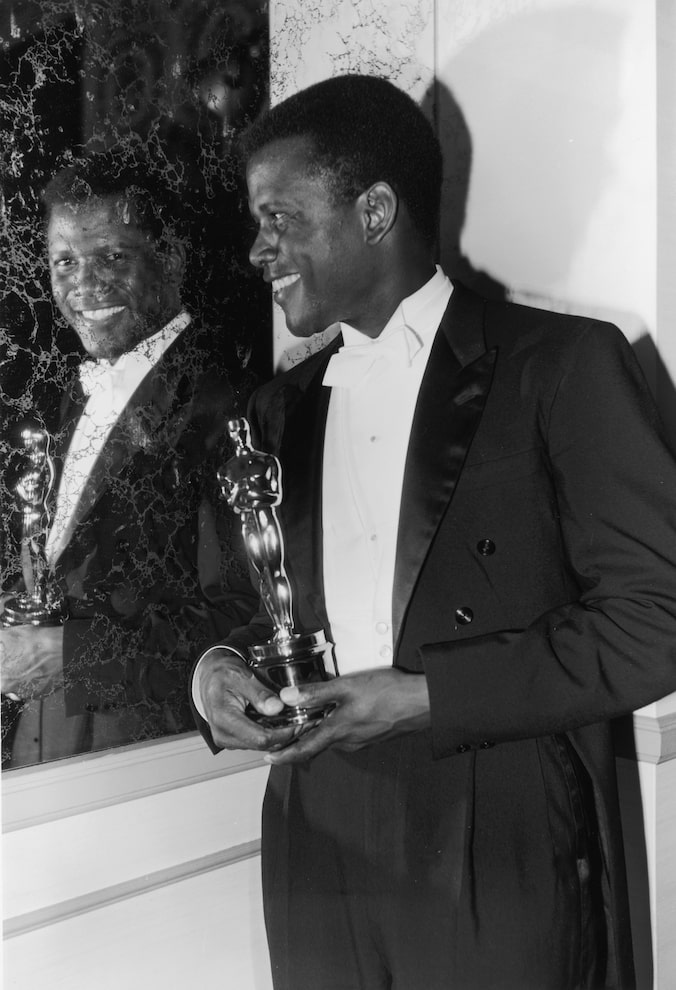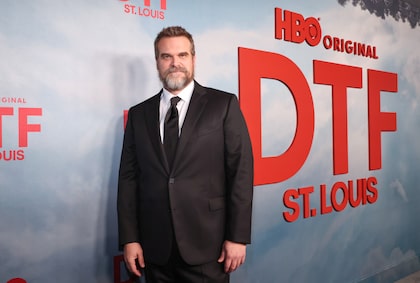Celebrity News January 07, 2022
Sidney Poitier, Oscar-Winning Trailblazer, Dies at 94
 Getty Images
Getty Images
Sidney Poitier, the first Black man to win the Oscar for Best Actor, has died at 94.
The Bahamian-American icon's death was confirmed by Bahamas Minister of Foreign Affairs Fred Mitchell, with no cause specified.
Just last month, it was announced that a new play by Charles Randolph-Wright called "SIDNEY" is being readied for Broadway by a team that includes Poitier's daughter, Anika Poitier.
Poitier was born unexpectedly in Miami on February 20, 1927, the youngest of seven children, while his farmer parents were visiting the city. An instant American citizen, he grew up on Cat Island and Nassau in the Bahamas, moving to Miami and then to NYC as a teenager, where he served at a psychiatric hospital during WWII in spite of being underage.
While working as a dishwasher, he was cast in an American Negro Theater production and made his Broadway debut in the short-lived 1946 production of "Lysistrata." He also starred in "Anna Lucasta" (1947) on Broadway.
Poitier's performance in his film debut "No Way Out" (1950), as a Black doctor treating a white bigot, set the tone for his at-the-time unusually three-dimensional career as a Black actor in Hollywood. He would go on to play many roles characterized by a central sense of morality and racial justice, quickly becoming an icon.
After "Cry, the Beloved Country" (1951) and "Red Ball Express" (1952), Poitier broke through to crossover stardom with films like "Blackboard Jungle" (1955) and "The Defiant Ones" (1958), in which he and Tony Curtis played escaped convicts handcuffed together. Poitier received his first Oscar nomination for the film, making him the first non-white nominee for Best Actor.
In 1959, he starred on Broadway in the first production of "A Raisin in the Sun," one of the most impactful plays of the era, winning the Tony for Best Actor, and in the film adaptation of "Porgy and Bess" (1959) with Dorothy Dandridge. He repeated his "A Raisin in the Sun" performance in the 1961 movie, and in 1963 starred in "Lilies of the Field," becoming the first Black man to win a competitive acting Oscar. Before him, Hattie McDaniel won Best Supporting Actress for her work in "Gone with the Wind" (1939) and James Baskett, who played Uncle Remus in "Song of the South" (1946), was given an honorary Oscar in 1948.
In spite of Poitier's unique place in film history and several other opportunities, he was never again nominated for an Oscar.
Poitier starred in "The Bedford Incident," "The Greatest Story Ever Told," and "A Patch of Blue" in 1965, but his peak came in 1967, when he was the #1 draw at the U.S. box office with back-to-back hits, each a pop cultural event: "To Sir, with Love," "In the Heat of the Night," and "Guess Who's Coming to Dinner." Each film dealt with racial issues, the latter portraying an interracial marriage (between Poitier's character and Katharine Houghton's) only months after marrying outside one's race became legal in 17 holdout U.S. states.
The mystery "In the Heat of the Night" spawned two movie sequels, "They Call Me MISTER Tibbs!" (1970) and "The Organization" (1971).
Poitier's acting slowed in the '70s and beyond as he spent time directing. On Broadway, he directed the unsuccessful "Carry Me Back to Morningside Heights" (1968), about a Jewish man who willingly becomes a slave to a Black student to do penance for racial injustice, starring Louis Gossett Jr., Diane Ladd and Cicely Tyson. He helmed nine films: "Buck and the Preacher" (1972), "A Warm December" (1973), "Uptown Saturday Night" (1974), "Let's Do It Again" (1975), "A Piece of the Action" (1977), the massive hit "Stir Crazy" (1980) with Richard Pryor and Gene Wilder, "Hanky Panky" (1982), "Fast Forward" (1985), and "Ghost Dad" (1990).
Later film roles included "Little Nikita" (1988), "Sneakers" (1992), and "The Jackal" (1997). He also appeared in a variety of TV movies and miniseries, including playing Supreme Court Justice Thurgood Marshall in "Separate but Equal" (1991), reprising his famous role for "To Sir, with Love II" (1996), playing Nelson Mandela in "Mandela and de Klerk" (1997), and his final work in any medium, starring in TV's "The Last Bricklayer in America" (2001).
Poitier was given an honorary Oscar in 2002, and made a rare appearance at the ceremony in 2014 to present Best Director. Knighted by Queen Elizabeth II in 1974, he was a 1995 Kennedy Center Honoree, and in 2009 was awarded the Presidential Medal of Freedom by President Obama.
At the time of his death, Poitier had been the oldest living Best Actor Oscar winner. (Gene Hackman is now the oldest.) A 1992 recipient of the AFI Life Achievement Award, he had been the last surviving honoree on AFI's list of 25 top male stars of Hollywood's Golden Era (all of whom made their film debuts in 1950 or before). The only living honoree from the list of 25 top female stars is Sophia Loren.
Poitier was married to Juanita Hardy from 1950-1965. After a high-profile relationship with legendary actress Diahann Carroll, married actress Joanna Shimkus in 1976. He is survived by her, their two daughters, and three of his four daughters with Hardy. His daughter Gina Poitier died at 57 in 2018.
























